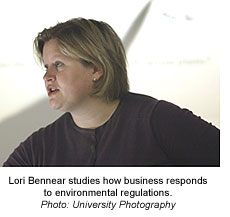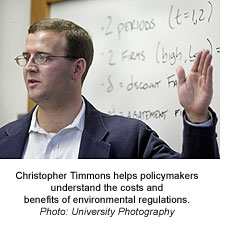|
 Doing the Numbers on the Environment Doing the Numbers on the Environment
Monte Basgall and Kelly Gilmer
Lori Bennear, Nicholas School
The call of the wolf helped attract Lori Bennear to the field of environmental economics.
Coming from Wyoming. Bennear said she was drawn to the discipline as an Occidental College undergraduate because the field helped explain some conflicts that had puzzled her in her native state – such as objections to reintroducing wolves.
“It seemed like a good idea,” she recalled. “Wolves used to be there and then we killed them and it seemed like it would be nice to let them back in. The ranchers were really upset about this. Taking environmental economics I suddenly understood what the controversy was.
“Paying the ranchers if their cattle were killed by wolves made it acceptable to them. I started to really think about both the costs and benefits of different types of environmental programs.”
As a new faculty member in the Nicholas School, Bennear assesses business responses to environmental regulations and standards. She is the school’s fourth environmental economist and the first to concentrate on domestic regulatory policy.
"Increasingly, the environmental community finds that the public demands an estimate of the costs and benefits of regulations and compliance," said William Schlesinger, the Nicholas School's dean. ""Lori's work helps us provide the economic analyses that are essential to this process."
For her own Ph.D. dissertation at Harvard, where she graduated before coming to the Nicholas School, Bennear used statistical analyses to reveal positive results among 14 states that require companies to have detailed management plans to reduce their use of toxic chemicals.
"The facilities in states that have these programs have decreased pollution at a faster rate," she said. "We're talking about a 20 to 30 percent difference relative to comparable facilities in other states.
Bennear has now begun working with Michael Lennox, an associate professor of management at the Fuqua School of Business.
She actually got hooked on economics in general before deciding to double major in that and environmental studies because the broader subject helped her understand other issues that she read about in newspapers, she said
After Occidental she decided to go to graduate school at Yale, but she was then confronted with a more theoretical kind of economics than she was used to. So she left school for a job with a Cambridge, Mass., consulting firm where she did economic analyses for the Environmental Protection Agency.
Her workplace experiences convinced her to finish her Ph.D., “but I wanted to pick a program that was going to be much more applied economics,” she said. While she was accepted at Duke, she elected to attend Harvard’s Kennedy School of Public Policy, where her principal mentor was an environmental economist.
According to Bennear, some economics professors "prefer being in an economics department surrounded by other people who do economics, even if you’re the only one interested in the environment.”
She joined the Nicholas School knowing that while her fellow faculty members are all interested in the environment she is in a distinct minority as an economist. But she prefers the environment of a professional school working with students like the 84 members of a masters of environmental management class that she is currently teaching.
Usually when you teach such a full class, people are there because they have to be and they're not positively enthusiastic, plus I teach it at 8:30 in the morning," she said. "However, I find the students to be much more open to economics and much more excited about this class than I expected.
“My goal is not necessarily to try to convince people that economics is the only way they should think about problems but to convince people that this is a very useful way to think about problems."
 Christopher Timmins, Department of Economics Christopher Timmins, Department of Economics
Listen to Audio:
 Basics of environmental economics. Basics of environmental economics.
 What drew him to Duke What drew him to Duke
As an undergraduate at Georgetown University, Christopher Timmins developed an interest in hiking and camping.
That love of the outdoors, coupled with a fascination in Middle East history, the oil industry and energy policy, led Timmins to environmental economics.
His current research interests focus on non-market valuation – that is, determining the value people place on commodities like clean air and clean water. The idea is that a cleaner environment comes at a cost. To determine how to balance a cleaner environment with other social goals, policymakers need to know what the former is worth.
“A lot of the things we might care about, things that we would want to protect with environmental regulation, don’t have easily observable values,” said Timmins, an associate professor of economics. “We know how much land is worth or how much groceries cost, but we don’t know how much a pristine view is worth. To figure out how much these things are worth, you look at alternative ways of measuring values.”
Timmins came to Duke this fall after spending seven years as an economics professor at Yale. There, he worked with then-Dean Richard H. Brodhead to develop an environmental studies curriculum. Prior to his time at Yale, Timmins earned his doctorate in economics at Stanford.
Thomas Nechyba, chairman of Duke’s economics department, describes Timmins as a rising star who adds to Duke’s growing strength in applied microeconomics.
“Chris is unique in that he is a first-rate applied microeconomist whose expertise spans the fields of public economics, environmental economics, industrial organization, urban economics and development economics,” Nechyba said. “Chris also represents a step toward re-building our connection with the Nicholas School and comes to us after winning university-wide awards for undergraduate teaching at Yale.”
Timmins said he was drawn to Duke because of the Nicholas School of the Environment and Earth Sciences, as well as Durham’s proximity to N.C. State University, the Research Triangle Institute and the U.S. Environmental Protection Agency’s Research Triangle Park office.
“Your work here can actually have an impact on policy,” said Timmins, who is teaching courses on environmental economics and public economic theory.
For instance, Timmins is just starting a project with Yale professor Nat Keohane – the son of former Duke President Nan Keohane – on a policy being considered by the EPA under President George W. Bush’s Clear Skies initiative.
Under this policy, the EPA would set a cap on total mercury emissions, but would allow companies to trade the right to produce those emissions. For the last 10 years, this sort of “cap-and-trade” policy has successfully lowered the costs of controlling sulfur dioxide emissions in the U.S.
But mercury is different from sulfur, Timmins said.
“Mercury tends to settle relatively close to where it is produced,” Timmins said. “You start to worry that power plants that buy the right to produce a lot of mercury in a tradable permit system might also be located in places where there are a lot of people.”
This increases the potential for adverse health effects that could wipe out cost savings. The research will look at whether the companies most likely to buy the right to emit mercury are located in high population areas, where the costs of pollution are high.
Timmins’ work also focuses on the value of clean air, particularly how that value affects decisions people make in deciding where to live and work. Previous research, Timmins said, typically has understated people’s willingness to pay for cleaner air by ignoring the simple fact that many people can’t easily move away from low-quality air.
“If you don’t account for the fact that all people can’t freely change where they live, you understate the costs for poor people and minorities and the less educated,” he said. Timmins’ research shows that traditional techniques understate how much high school dropouts value clean air by more than 50 percent, compared to just under three percent for college graduates.
Timmins also does research in Latin America, including Brazil and Colombia. No matter the subject, Timmins often hires undergraduates as research assistants. He enjoys mentoring undergraduates, he said, because they are committed to the work and willing to explore new ways of thinking.
The students benefit, too, from the exposure to environmental economics problem-solving.
“A lot of economics is really about the way markets fail to work well – environmental economics is mainly about this,” he said. “I think it is important for an economics major, even if he or she is going to work as a consultant or investment banker after graduation, to get a sense of this. It provides a healthy sense of skepticism about the market’s ability to solve everything.”
In his free time, Timmins and his wife Jody, who is finishing her Ph.D. in history, care for their triplets, who will be four years old in January. Timmins, who has his children’s drawings framed on his office wall along with a picture of Yellowstone National Park, has taken his brood camping and hiking in the woods. But the trips have been short, he said, because they get tired after about a half-mile.
Once they get a little older, he plans to take advantage of North Carolina’s scenic trails.
“I hear the Smokies are nice,” he said. “But the air quality isn’t great. We’ll give them some time to clean it up and then take the kids.”
|





